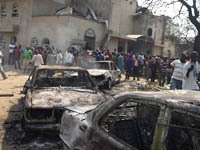Gaddafi's weapons rattle in Nigeria
 Islamists of Nigeria associated with the Afghan Taliban and the fundamentalist Algerians will continue unleashing their war against the government of this country to a complete victory and the establishment of Sharia throughout its territory.
Islamists of Nigeria associated with the Afghan Taliban and the fundamentalist Algerians will continue unleashing their war against the government of this country to a complete victory and the establishment of Sharia throughout its territory.
This is how they commented on the terrorist attacks that occurred during the Catholic Christmas in several cities of the country against the Christian churches and police stations. On December 25-26, extremists killed at least 40 people.
The biggest victims were recorded in the explosion of the Church of St. Therese on the outskirts of the capital Abuja, killing 35 people. The power of the explosion was such that the church roof collapsed. After this, the bombs were dropped at churches in the cities of Jos (center) and Gadaka in the north. In the town of Damaturu, also located in the north, there were two explosions at police stations. As a result, three policemen were killed.
The extremists did not stop there. On December 26, they set on fire 30 stores owned by Christians in Potiskum and the house of the leader of the local Christian community. After that, local sources have reported the escape of the Christian population, not only from Potiskum, but also from Damaturu. Experts do not rule out the possibility that if the authorities hesitate to restore order, sectarian unrest could reach a much more serious scale, as it has happened before.
A number of Western experts have linked the activity of the Islamists with the results of the presidential elections held in May, won by the Christian Goodluck Jonathan, after which the country was engulfed by violence. Over the last six months there have been dozens of attacks in Nigeria, which killed hundreds of people. The biggest one was the August attack at UN headquarters in Abuja that killed over 20 people.
It should be noted that the Christmas attacks on Christian churches have become tradition for the local Islamists. For example, in 2010, 38 people fell victims of violances. The problem in the country did not emerge in May. Major role in this exacerbation was played by a radical Islamist group "Boko Haram" ("Western Sin"), or as the militants like to call themselves, "Jamaat ahlis Sunnah wal-Jihad Liddaavati" ("Society of adherents who spread the teachings of the Prophet and Jihad"), seeking destruction of the secular state, the western model of education and the introduction of Sharia law throughout Nigeria.
This organization was founded in 2002 by the "preacher" Mohammad Yousuf in the Nigerian city of Maiduguri. With the money of the Gulf Arab sheikhs who made their generous donations to the Afghan mujahideen, Yusuf had built a religious complex, including a mosque and a school "to educate" children. But in reality, it became the center of recruiting and training of fighters. Nigeria interested the "customers" as a country with major human and energy resources that plays a major role on the continent.
Finally, in 2004, having obtained the desired number of followers, Yusuf moved to the area of Gangnam (Yobe State), where they created a base with the eloquent title "Afghanistan", where the Islamists started attacking the police.
However, the first really serious attack of its fighters was carried out on July 26, 2009, when they tried to seize power in northern Nigeria. The attacks that started in Bauchi State with successful attacks on the Anglican Church and police stations have failed.
Three days later, on July 29, the authorities turned the tide in their favor. The police stormed the old base groups in Maiduguri, and Mohammed Yusu died on August 9 in unclear circumstances.
However, this failure did not lead to the destruction of the terrorist group. On September 7, 2010 50 militants of "Boko Haram" suddenly attacked a prison in the state of Bauchi with over 700 of their associates, and freed them.
After that, the Islamists markedly increased the number of attacks. According to local sources, in 2011 Boko Haram killed 465 people. The main reasons why the Islamists cannot be destroyed is the corruption when the officials abuse their power, and poverty. The latter creates nearly unlimited room for the radicals who have large finances.
What are the prospects of the fight for power? In the future, we cannot rule out the fact that the Islamists in a favorable scenario will be able to break off the northern part of the most populous country in Africa (160 million).
"Boko Haram" has many trump cards, including the availability of sponsors of the Arab Gulf countries and the support of the "Al Qaeda" and its North African branch of AQIM. At least, this was reported by Algerian security forces, which indicated that the Islamists have managed to transfer some weapons seized in Libya to its Nigerian allies.
However, "Boko Haram" has its weaknesses hindering its ability of a victory of a secular regime. First, it failed to enlist the support of the majority of Muslims of Nigeria, who do not want to rush into extremes and live according to Sharia. Recently "Boko Haram" declared "war on the influence of moderate Islam."
Second, it would be much harder to seize power in the south, where Christians are historically concentrated. Without the South the victory will not matter much to the Islamists because it is there the major oil fields are and it is the place that to a large extent supplies the rest of Nigeria's with food and other goods.
Sergei Balmasov
Pravda.Ru
Subscribe to Pravda.Ru Telegram channel, Facebook, RSS!




